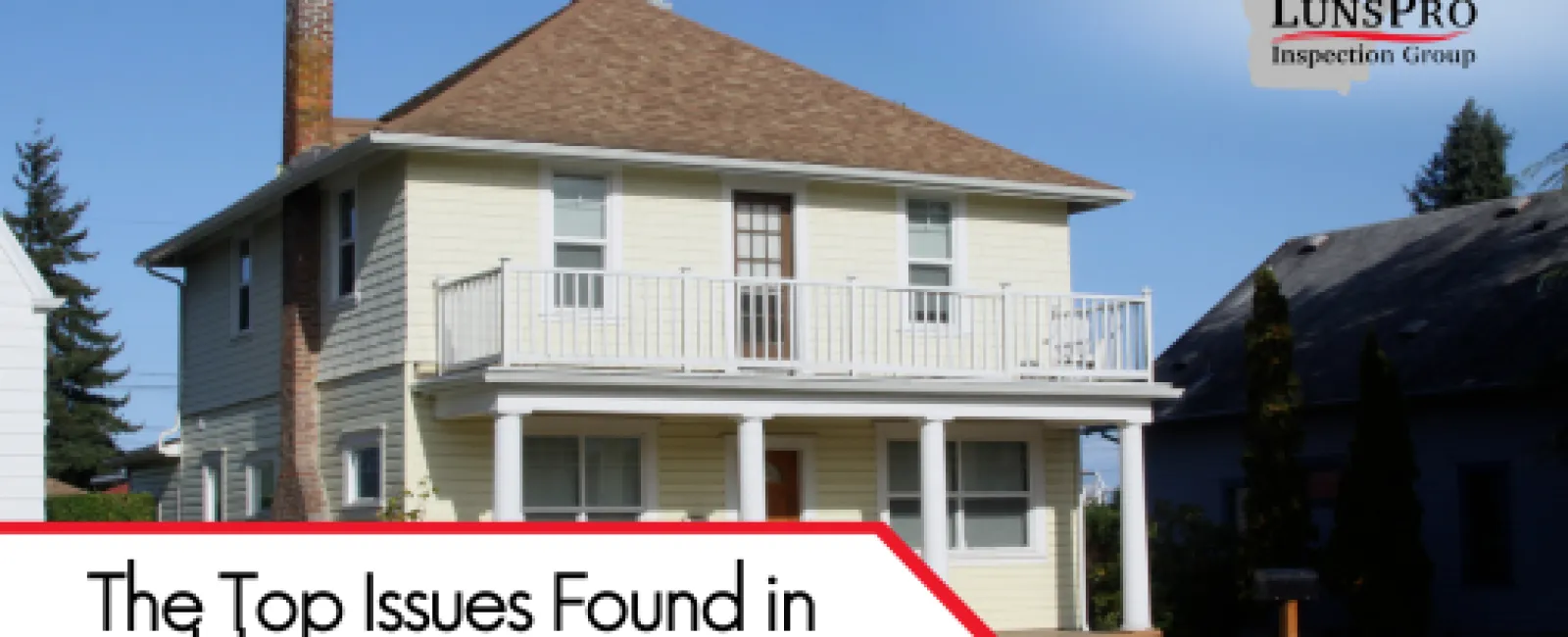Older homes hold a special charm. From historic architecture to vintage fixtures, they often come with character that newer homes can't replicate. However, behind the charm of these structures can lie a series of costly and sometimes dangerous problems. For homeowners in the Carolinas—particularly in cities like Charlotte, Greensboro, and Raleigh—these issues are even more pressing due to the region's climate, soil conditions, and varying construction standards over the years.
At LunsPro Inspection Group, we've seen firsthand how age impacts a home's condition. While some older properties have been meticulously maintained, others can harbor hidden defects that aren't immediately visible to the untrained eye. Whether you're buying a classic bungalow in the Triad or maintaining a colonial-style residence in the Triangle, a comprehensive home inspection is crucial for uncovering potential problems and planning effective solutions.
1. Foundation and Structural Issues
One of the most critical—and common—problems found in older homes is foundation damage. Over time, soil settlement, tree root intrusion, and water infiltration can compromise the structural integrity of a home. In the Carolinas, expansive clay soil and fluctuating moisture levels further complicate these issues, making foundation concerns a top priority during Carolina home inspections.
Signs of foundation damage include uneven flooring, cracked walls, doors that no longer close properly, and visible shifts in the structure. During LunsPro Inspection Group's Charlotte, Greensboro, and Raleigh Residential and Commercial Inspections, our trained inspectors pay special attention to crawl spaces, basements, and slab foundations. We assess for water intrusion, structural shifts, and wood rot—all of which can signal underlying foundational problems.
Early identification of foundation issues allows homeowners to address them before they escalate. In some cases, simple drainage improvements or minor repairs may suffice. In others, structural reinforcement may be necessary to restore long-term stability.
2. Outdated Electrical Systems
Many older homes still rely on original electrical systems that were designed to handle a fraction of the power usage we see today. Knob-and-tube wiring, fuse boxes, and ungrounded outlets are common in homes built before the 1970s. These systems not only fail to meet modern code requirements but also present significant fire hazards.
A detailed inspection by LunsPro Inspection Group includes evaluating the condition and capacity of the home's electrical system. Inspectors check for overloaded circuits, outdated wiring, insufficient GFCI protection, and improper DIY modifications made over the years.
For homeowners in the Triad and Triangle Areas, upgrading an outdated electrical system is more than a convenience—it's a safety necessity. A modernized system ensures that your home can support modern appliances, HVAC units, and electronic devices without risk of overload or electrical failure.
3. Aging Plumbing and Pipe Materials
Older homes often contain galvanized steel or cast-iron pipes, both of which are prone to corrosion and internal buildup over time. These materials can restrict water flow, cause leaks, and contribute to poor water quality. Additionally, homes built before 1986 may contain lead pipes or solder, raising concerns about drinking water safety.
In Carolina home inspections, plumbing issues are a frequent discovery. Our inspectors assess visible piping, check for leaks, test water pressure, and look for signs of moisture intrusion behind walls or under sinks. We also inspect sewer lines when necessary—an essential step for older homes that may have root intrusion or deteriorated lines.
Replacing aging pipes may seem like a daunting investment, but doing so can prevent far more expensive water damage and potential health risks in the future.
4. Inefficient or Hazardous HVAC Systems
Heating and cooling technology has improved significantly in recent decades. Unfortunately, many older homes are still operating on outdated HVAC units, or worse—original systems that haven't been properly maintained. These older systems can pose serious risks, including carbon monoxide leaks from malfunctioning furnaces or unsafe venting.
LunsPro Inspection Group's Charlotte, Greensboro, and Raleigh Residential and Commercial Inspections include a comprehensive HVAC evaluation. We examine the age and condition of the units, check for proper installation and ventilation, and review service records when available. Inspectors also assess attic and crawl space insulation to determine whether energy efficiency is being compromised.
Carolina summers and winters demand reliable HVAC systems. Upgrading or maintaining your system not only improves indoor comfort—it also increases safety and reduces utility costs.
5. Roof Deterioration and Leaks
Roofs typically have a lifespan of 20 to 30 years, depending on the material and environmental conditions. Older homes, particularly those that have not undergone recent renovations, are at a higher risk for missing shingles, worn flashing, deteriorated seals, and hidden leaks.
During a LunsPro home inspection, we thoroughly evaluate roof surfaces, flashings, gutters, and attic interiors for signs of water intrusion. Water stains, mold, and soft spots in ceilings often indicate a long-standing roof issue that may have already compromised other parts of the home.
For homeowners in the Carolinas—especially in areas that experience heavy rains and storms—roof condition is a critical part of long-term property protection.
6. Poor Drainage and Water Intrusion
Water damage is one of the most insidious threats to any home, and older properties often suffer from poor grading, outdated drainage systems, or clogged gutters. These issues lead to moisture buildup in crawl spaces and basements, contributing to foundation issues, mold growth, and wood rot.
At LunsPro Inspection Group, we emphasize drainage assessment in every Carolina home inspection. Our inspectors look for standing water near the foundation, clogged downspouts, improper grading, and moisture levels in crawl spaces. These problems are particularly common in homes built before modern waterproofing techniques became standard.
Addressing drainage problems early can prevent thousands of dollars in structural damage and mold remediation. Solutions may include extending downspouts, regrading soil, or installing a French drain or sump pump system.
7. Environmental Hazards: Asbestos, Lead Paint, and Mold
Older homes often contain materials that are no longer considered safe by today's health and safety standards. Lead-based paint (banned in 1978) and asbestos (commonly used until the 1980s) are two common concerns. Mold is also frequently found in homes with long-term moisture issues, particularly in the humid Carolina climate.
A LunsPro home inspection includes a visual check for potential environmental hazards. If materials suspected to contain asbestos or lead are found, we recommend specialized testing and remediation. We also check for signs of mold in attics, crawl spaces, and bathrooms—areas where moisture tends to accumulate in older homes.
These issues can affect not just your property value, but also the health of those living in the home. Early detection allows homeowners to take appropriate action through certified environmental specialists.
8. Poor Energy Efficiency and Insulation
Older homes were not built with modern energy efficiency in mind. Single-pane windows, uninsulated walls, and poorly sealed doors and vents contribute to high energy bills and inconsistent indoor temperatures.
Our inspectors evaluate insulation levels, window conditions, and ductwork integrity to determine where energy is being lost. For Carolina homeowners, especially those in older neighborhoods in Charlotte, Greensboro, or Raleigh, improving energy efficiency can result in long-term savings and enhanced comfort.
Simple upgrades like adding attic insulation, sealing gaps, and replacing drafty windows can significantly reduce heating and cooling costs, all while making your home more environmentally friendly.
9. Why Ancillary Services Matter—Especially in Older Homes
In addition to standard home inspections, ancillary services like sewer scope inspections, radon testing, and mold testing play a vital role in identifying hidden issues in older properties. These services are especially important in Carolina homes that are several decades old, where aging infrastructure and long-term wear can lead to costly surprises.
Sewer scope inspections, in particular, are strongly recommended for older homes. Many older properties in Charlotte, Raleigh, and Greensboro were built with clay, cast iron, or Orangeburg piping—materials that are susceptible to cracking, deterioration, or collapse over time. Tree root intrusion is another common issue, especially in mature neighborhoods with large trees. Over the years, roots can infiltrate sewer lines through small cracks or joints, eventually causing blockages, backups, or total line failure.
A sewer scope inspection with LunsPro Inspection Group involves inserting a high-resolution camera into the home's main sewer line to visually assess the condition of the piping. This service provides clear insight into issues that can't be detected from inside the home, such as root growth, pipe sagging, cracks, and corrosion. For homebuyers and current owners alike, this kind of assessment can help avoid thousands of dollars in unexpected sewer repairs.
Other valuable ancillary services for older homes include:
Mold Testing - High humidity and poor ventilation in older homes often lead to hidden mold, especially in basements, attics, and behind walls. Professional testing can confirm presence and severity.
Radon Testing - While radon is more commonly associated with certain geological regions, it's not uncommon in the Carolinas, particularly in homes with basements or crawl spaces.
Thermal Imaging - This service can identify hidden moisture, insulation gaps, and electrical hot spots that aren't visible during a standard inspection.
Including these services as part of your Carolina Residential or Commercial Inspection gives you a far more complete understanding of the home's condition—especially important for older properties with aging systems that may have been modified over the years.
Why LunsPro Is the Trusted Choice in the Carolinas
With decades of combined experience, LunsPro Inspection Group has become a trusted name for Charlotte, Greensboro, and Raleigh Residential and Commercial Inspections. We specialize in inspecting older properties, bringing local expertise to every inspection in the Triad and Triangle Areas.
Our team understands the unique challenges that Carolina homeowners face—especially when it comes to foundation integrity, pest activity, and structural degradation. We provide detailed reports, complete with photos, explanations, and recommendations, so homeowners can make informed decisions whether they're buying, selling, or renovating.
Protect Your Investment—Start with a Thorough Inspection
Purchasing or maintaining an older home can be a deeply rewarding experience, but it also comes with responsibilities. From hidden leaks to outdated wiring, older homes require a deeper level of scrutiny to ensure safety, efficiency, and long-term durability.
A professional inspection from LunsPro Inspection Group provides the insight and confidence needed to tackle these challenges. Whether you're in Charlotte, Greensboro, Raleigh, or anywhere else in the Triad or Triangle Areas, our Carolina home inspections are tailored to identify the most common issues found in older homes—especially those that affect the foundation and structural integrity of the property.
Don't let the charm of an older home blind you to its potential risks. Contact LunsPro Inspection Group today to schedule a comprehensive inspection and safeguard your investment from the ground up.

